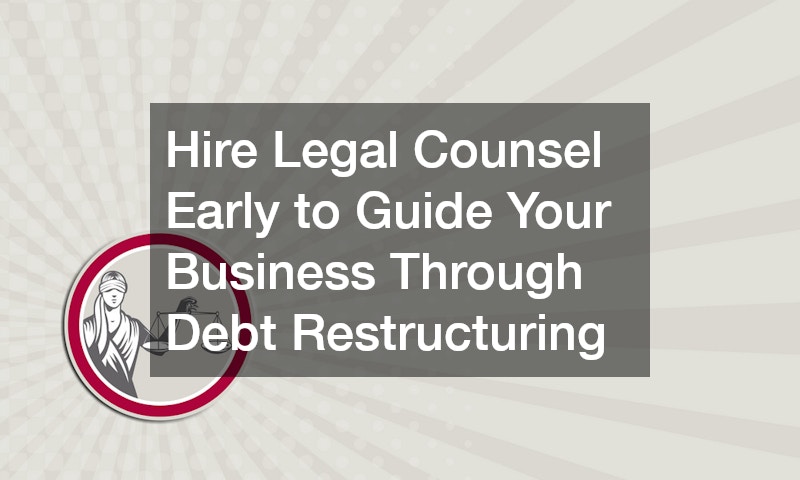Bankruptcy in business is a challenging but sometimes necessary procedure that helps companies restructure or liquidate their obligations. For many entrepreneurs, navigating the complexities of bankruptcy can feel overwhelming, but with the right strategies and guidance, it can also lead to a fresh start. Understanding the various aspects of bankruptcy, from legalities to asset management, is crucial for the survival and rebirth of a business facing financial distress.
One of the most critical steps is to collaborate closely with financial experts to develop a tailored bankruptcy strategy that aligns with your business’s unique goals and circumstances. This collaboration can help you identify potential risks and opportunities as you progress through the bankruptcy process. In this article, we will explore essential strategies that can help guide your business through bankruptcy and set the stage for a successful recovery.
With the right approach, bankruptcy in business doesn’t have to signify the end; rather, it can be a strategic move towards a more sustainable financial future. This article aims to uncover effective methods for managing business bankruptcy, including the importance of professional guidance and strategic planning. Let’s dive into the key steps to take when navigating bankruptcy in business.
Work with Financial Experts to Develop a Bankruptcy Strategy for Your Business

When your business is facing bankruptcy, working closely with financial experts is essential for developing a robust bankruptcy strategy. Financial advisors can provide invaluable insights and help identify viable options for navigating your business through the bankruptcy process. Collaborating with these specialists allows for a more informed decision-making process concerning your company’s financial future.
A well-devised bankruptcy strategy must take into account the unique financial landscape of your business, including your assets, liabilities, and market position. These experts will conduct a thorough analysis of your financial situation, enabling you to create a plan that prioritizes cash flow management and debt restructuring. Moreover, the guidance of financial experts can also help in exploring potential sources of loans or financing that may be available to assist in recovery.
Finally, including accounting firms in your strategy can facilitate clearer financial tracking and reporting. They can help manage financial records during bankruptcy, thus ensuring compliance with legal requirements and improving overall transparency. In summary, harnessing the expertise of financial professionals can significantly increase your chances of successfully navigating bankruptcy in business.
Hire Legal Counsel Early to Guide Your Business Through Debt Restructuring

The importance of hiring a bankruptcy attorney early in the process cannot be overstated, as they bring essential legal knowledge needed to navigate bankruptcy in business efficiently. Engaging a legal counsel skilled in debt restructuring will help protect your interests, guiding you through every legal requirement while minimizing the risk of missteps. Early intervention by an attorney can also lead to more favorable outcomes during negotiations with creditors.
Understanding the different bankruptcy options, such as Chapter 7 and Chapter 13, is crucial for determining the best path for your business. Consulting with chapter 13 bankruptcy attorneys or chapter 7 bankruptcy attorneys allows you to evaluate the potential benefits and drawbacks of each option relative to your business’s financial situation. Your counsel will help you design a solid plan that may include a complete liquidation in Chapter 7 or a court-approved debt repayment plan in Chapter 13.
Additionally, effective legal representation can help you identify potential claims and defenses that could influence the bankruptcy outcome. These legal professionals will work with you to prepare necessary documentation and filings to meet statutory deadlines, ensuring that you remain compliant throughout the process. Not only does this protect your business from legal complications, but it also helps foster a more favorable environment for restructuring efforts during bankruptcy in business.
Create a Clear Debt Repayment Plan to Reorganize Your Business During Bankruptcy
Establishing a clear debt repayment plan is a critical component when navigating bankruptcy in business, particularly during processes like Chapter 13. This plan should outline how your business intends to repay or negotiate its debts over a specified period while ensuring ongoing operations remain undisturbed. A well-structured repayment plan contributes to reestablishing financial stability and can even restore creditor confidence in your business.
Expert chapter 13 and chapter 7 bankruptcy attornies will play a vital role in developing this repayment plan, as they will analyze your company’s cash flow, outstanding debts, and business expenses. Knowing the current financial conditions allows you to create realistic repayment terms that consider the liquidity of your business and the needs of your creditors. By incorporating flexibility into the repayment plan, you can better position your business for potential economic fluctuations during and after the bankruptcy process.
Additionally, as you devise your repayment strategy, be sure to include provisions for addressing ongoing operational costs. Maintaining essential functions while adhering to your repayment obligations is critical in ensuring business continuity. A well-executed debt repayment plan will not only position your business for recovery but also lay a foundation for long-term financial health post-bankruptcy.
Follow Legal Steps for Efficiently Liquidating Business Assets to Pay Debts
Liquidating business assets during bankruptcy is often a necessary step in meeting obligations to creditors. However, it is crucial to follow legal protocols to ensure that assets are sold efficiently and equitably. Your bankruptcy attorney will guide you through the legal steps, making sure you adhere to the requirements governing the sale of assets during bankruptcy proceedings.
Efficient asset liquidation involves a comprehensive evaluation of all business assets to determine their current market value. This assessment helps you prioritize which assets should be sold first based on need and potential return. Local attorneys familiar with bankruptcy laws can assist you in understanding the implications of each asset sale, ensuring you make informed decisions throughout the liquidation process.
Moreover, working with a business broker can facilitate the asset sale process by leveraging their connections and expertise to find potential buyers quickly. Business brokers play a crucial role in marketing your assets, facilitating negotiations, and closing deals, all of which can maximize your returns from sales. In conclusion, following structured legal steps for liquidating assets ensures that you comply with regulations while optimizing the amounts obtained to settle debts during bankruptcy in business.
Consult Local Attorneys to Navigate Bankruptcy Proceedings and Minimize Risk
In navigating bankruptcy, consulting local attorneys who specialize in bankruptcy law is essential to minimize potential risks and errors throughout the proceedings. Local attorneys not only possess the relevant legal expertise but also have knowledge of the specific bankruptcy rules and regulations governing your jurisdiction. This localized knowledge can greatly influence the outcome of your bankruptcy case.
Working with local attorneys gives you access to valuable resources and networks, which can be helpful in your efforts to secure additional financing or negotiate with creditors. Their familiarity with regional markets and the local business environment can aid in devising strategies for restructuring your debts effectively. These lawyers can also represent your business in court, ensuring that your rights are protected and advocating for your interests throughout the bankruptcy process.
Furthermore, local attorneys can assist in preparing all necessary legal documentation and filings to ensure smooth progress through bankruptcy proceedings. Timely and accurate filings are crucial in avoiding additional complications or delays. Ultimately, selecting experienced local attorneys can provide you with peace of mind, knowing that you have knowledgeable advocates on your side as you navigate the complexities of bankruptcy in business.
Assess Loan Options and Restructure Debt During the Bankruptcy Process

As part of the bankruptcy process, assessing available loan options can provide your business with the necessary resources to maintain operations and facilitate recovery. Understanding various financial products tailored to businesses in distress could open doors to crucial capital that was previously unavailable. That said, it’s essential to weigh the pros and cons of different loans, especially considering the long-term implications of acquiring new debt during bankruptcy in business.
During this evaluation, remember to also discuss restructuring existing debt with your bankruptcy attorney. Restructuring can involve negotiating more favorable terms with creditors, including reduced interest rates or extended payment periods. A strategic approach to both new and existing loans will not only help ease immediate financial strain but also contribute to a longer-term plan for regaining financial health post-bankruptcy.
Engaging financial experts, including attorneys and accountants, during this stage of the process is advisable. They can guide you through the intricacies of loan assessments and debt restructuring, ensuring that your business pursues the best course of action for its financial recovery. Comprehensive evaluation and strategic planning in this critical phase can set the stage for rebuilding your business successfully after bankruptcy.
Engage a Business Broker to Sell Your Company During Bankruptcy for a Fresh Start
When faced with bankruptcy, engaging a business broker can be an effective strategy if selling your company is an option for a fresh start. A broker can provide a comprehensive understanding of the market values associated with your industry, ensuring that you receive a fair price for your business. Their expertise in marketing your company and navigating the sales process can make the difference between a successful sale and a prolonged struggle.
A business broker acts as an intermediary between you and potential buyers, allowing you to focus on other critical aspects of your bankruptcy process. They can manage negotiations, create confidentiality agreements, and promote your business to qualified prospects. With their assistance, you may discover buyers who understand the potential growth opportunities and challenges, optimizing the sale process and maximizing value.
Furthermore, selling your business with the help of a broker can provide needed funds to pay off creditors or invest in a new venture post-bankruptcy. This fresh start can be pivotal in setting a new trajectory toward financial stability. Overall, engaging a business broker provides a strategic avenue for successfully navigating bankruptcy in business while positioning you for future success.
Explore Mergers as an Actionable Strategy to Save Your Business from Bankruptcy

Considering a merger can be a strategic move to save your business from an impending bankruptcy situation, allowing you to pool resources and share liabilities with another entity. Mergers and acquisitions can create synergies that enhance operational efficiencies, reduce costs, and increase revenue potential. This option may also ease access to additional capital and market share that could help stabilize your financial position.
Working alongside business lawyers who specialize in mergers can streamline the process and ensure that your interests are adequately represented during negotiations. These professionals will help evaluate potential partners and assess the implications of a merger, ensuring due diligence is performed to avoid future complications. The right merger can lead to a stronger, more resilient organization capable of overcoming the challenges that led to bankruptcy.
Moreover, exploring a merger can often lead to favorable negotiations with creditors, as the likelihood of recovery improves with a stronger combined entity. Open communication with stakeholders throughout this process is vital, as it fosters trust and helps in mitigating the negative reputational impacts of bankruptcy. Ultimately, leveraging mergers as a proactive strategy can position your business for robust recovery and growth after experiencing financial distress.
Protect Your Business Assets by Consulting Legal Professionals During Bankruptcy
Protecting your business assets during bankruptcy in business is paramount, and consulting legal professionals is critical in achieving this goal. Experienced attorneys will guide you on how to categorize and protect your assets legally and strategically, maximizing the protections available under bankruptcy laws. Effective asset protection can be instrumental in ensuring that you retain crucial business resources needed for a fresh start.
Legal counsel can assist in identifying which assets may be exempt from liquidation, helping you retain essential components of your business operation. They can also help you navigate complex laws regarding asset transfers and exclusions, ensuring compliance with bankruptcy regulations. By actively protecting your assets, you can maintain a level of functioning capacity during bankruptcy, which can be vital for the long-term recovery of your business.
An attorney’s guidance is invaluable when it comes to restructuring ownership arrangements, which could further protect assets from being seized during bankruptcy proceedings. This proactive approach not only safeguards your assets but also positions your business for future growth. With the support of legal professionals, you can steer your business through turbulent waters while minimizing risks and promoting a sustainable recovery.
Set Up a System for Preventing Financial Missteps During Your Bankruptcy Filing
Establishing a system to prevent financial missteps during your bankruptcy filing is essential to maintain order and transparency throughout the process. Accurate financial recordkeeping and regular monitoring of your business’s financial transactions ensure that you adhere to legal requirements while avoiding unexpected complications. Implementing a robust accounting framework can also help facilitate easier communication with your bankruptcy attorney and other professional advisors.
It’s advisable to designate a trusted financial officer or hire an accounting firm that specializes in businesses undergoing bankruptcy. This individual or team can oversee all transactions, whether related to debt repayment, asset liquidation, or ongoing operational expenses. Their expertise will greatly enhance your ability to identify potential financial red flags in real time, enabling you to make proactive adjustments as needed.
Furthermore, developing clear communication protocols among all parties involved in the bankruptcy process can prevent misunderstandings and keep your team focused on achieving the desired outcomes. Regular meetings and updates can keep all stakeholders aligned and informed on any changes or developments. By establishing these systems, you significantly reduce the risk of errors that could disrupt your bankruptcy filing and your path to recovery.
Implement a Plan to Transition Your Business Successfully After Bankruptcy
The transition period following bankruptcy in business is crucial for setting the stage for a successful recovery. Creating a comprehensive post-bankruptcy plan helps you identify and seize opportunities while mitigating risks as you move forward. This plan should include strategies for rebuilding your business’s creditworthiness, operational improvements, and strategic goal-setting that align with long-term growth.
Your plan may involve reestablishing your brand by launching targeted marketing campaigns that communicate your renewed focus and commitment to customers. Engage with stakeholders, including creditors, suppliers, and employees, to keep them informed of your recovery strategies while addressing any lingering concerns. Building trust and transparency during this time is vital, as it lays the groundwork for sustainable relationships that can foster future business opportunities.
Additionally, consider implementing a structured financial management system that emphasizes accountability and transparency within your operations. This framework can help oversee cash flow, monitor expenses, and ensure that debts are repaid as planned. The principles learned throughout the bankruptcy process can serve as a valuable guide for transitioning your business sustainably and successfully post-bankruptcy.
Manage Your Business’s Reputation During Bankruptcy by Working with PR Experts
Maintaining a positive reputation during bankruptcy in business is essential, and collaborating with public relations (PR) experts can be a game-changer in this regard. These professionals can assist in crafting messages that resonate with your target audience while addressing any concerns or misconceptions arising from the bankruptcy proceedings. A strategic PR approach can help convey your dedication to recovering and improving the business while fostering customer loyalty in challenging times.
PR experts can also help you manage media inquiries and control the narrative surrounding your bankruptcy case, presenting it as a proactive step towards financial health and resilience. Engaging in transparent communication with stakeholders throughout the process can counteract negative perceptions and promote understanding. By informing clients, partners, and employees of your intentions and strategies, you cultivate trust, which is crucial for rebuilding your brand image.
Additionally, consider leveraging social media and digital channels to communicate your business’s journey and progress during bankruptcy. Sharing updates on recovery efforts and new initiatives portrays a positive trajectory, showcasing your commitment to learning from past challenges. Proactively managing your reputation with the help of PR professionals can provide significant advantages as you work towards revitalizing your business in the post-bankruptcy landscape.
Take Steps to Rebuild Your Business’s Credit and Financial Health After Bankruptcy
Rebuilding your business’s credit and financial health after bankruptcy is a crucial step towards long-term sustainability. The process begins with assessing your current credit standing and understanding the specific factors contributing to credit assessments. Implementing good financial habits, such as maintaining a positive cash flow and paying bills on time, can gradually restore your creditworthiness over time.
As you work on repairs, consider establishing new credit accounts with reputable vendors who allow for business credit transactions. Securing small loans and consistently making timely payments can also help boost your credit profile. Engaging with accountants or credit repair specialists can provide further insights and strategies tailored to your business’s recovery needs.
Moreover, transparency and open communication with lenders regarding your bankruptcy situation can go a long way in rebuilding trust. By demonstrating your commitment to financial responsibility and presenting a solid business plan for the future, you can foster a more favorable perception among lenders. Through diligent efforts and strategic planning, restoring your business’s financial health after bankruptcy is indeed achievable.
Bankruptcy in business, while daunting, offers a pathway to reorganization and renewed financial health when effectively managed. By leveraging the expertise of financial and legal professionals, developing clear action plans, and maintaining open communication with stakeholders, business owners can navigate bankruptcy successfully. The strategies outlined in this article provide a roadmap for tackling bankruptcy, ensuring you can emerge on the other side stronger, more resilient, and ready for future opportunities.
Whether you’re conducting asset liquidation, considering a merger, or seeking additional financing, the importance of a tailored approach cannot be underestimated. Your business’s future depends on strategic planning and proactive steps throughout the bankruptcy journey, so take the necessary measures to protect your interests while positioning your enterprise for sustainable growth. Ultimately, with careful navigation and a clear focus, bankruptcy can become a stepping stone toward a brighter financial future.







